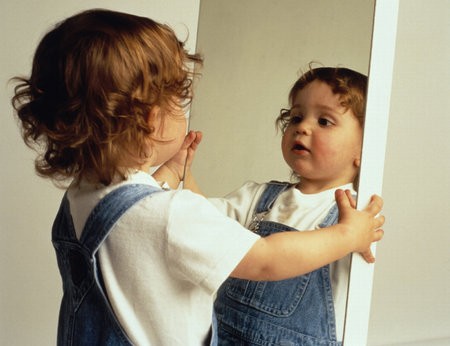
When is a mirror more than a mirror? This week we double up on the Torah portion as we conclude reading from the book of Exodus. Vayak'heil and P'kudei describe in more detail the building of the Tabernacle and all of the objects and furnishings that made up this holy place. We are told that the ritual sink that served the priests was formed from copper and from mirrors. What an interesting detail to offer in the context of this great initiative. What is so special about mirrors?
A mirror is simply a piece of treated glass that reflects our visages back to us, preventing us from seeing through the glass. Reading about mirrors in the Torah portion, I was reminded of the initial phase of our JMAP Community Study, when I had the opportunity to look beyond the looking glass.
As part of the research for the study, we conducted a focus group of individuals from across Greater Hartford who self-identified as Jewish but who - on a scale of 1 to 10 - all rated themselves 5 or below in terms of their connectedness to the Jewish community. Jewish organizations commonly refer to such individuals as "unaffiliated."
One of the most significant challenges facing the Jewish people is how we can more effectively engage and connect with those we label "unaffiliated." Because they live outside our inner circles, we don't know much about them - and we have often assumed that they don't care about being Jewish.
Observing the focus group behind a two-way mirror, I discovered how wrong we were.
The members of our focus group didn't belong to synagogues or pursue formal Jewish education for their children, and many were in interfaith marriages - but their profound yearning for a Jewish connection came across loud and clear. Several spoke of repairing a connection that had broken many years ago when they felt marginalized and unwelcomed. Others were searching for a spiritual connection they had never been able to find. Still others sought to rekindle fond memories of attending their grandparents' Seder or celebrating another Jewish holiday or life cycle event.
When we look into a mirror, we see only our own reflection. We try to look beyond it, but we can only picture what isn't there in relation to our own image. I'd like to suggest that we try replacing our metaphorical mirrors with windows - for an unfettered look that takes us beyond what we wish to see.
There is so much more to our Jewish community than what those of us at its core reflect back to ourselves. We must be willing to look beyond, reach beyond, and open our arms to those who seek a connection - even if it means seeing and doing things a little bit differently.
If the Israelites could find a way to acknowledge and overcome their differences and to embrace the core values that ultimately created our Jewish people, we can certainly continue that tradition today.
Shabbat Shalom.
Howard
Howard Sovronsky
President and CEO

0Comments
Add CommentPlease login to leave a comment